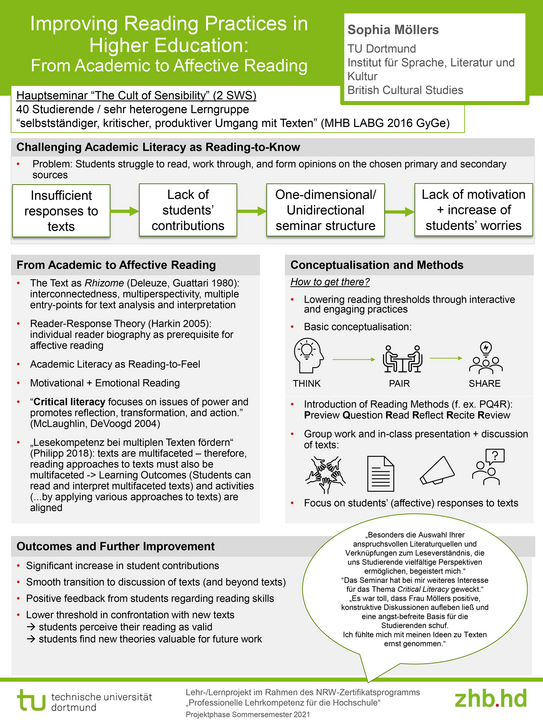Improving Reading Practices in Higher Education: From Academic to Affective Reading
Sophia Möllers
Fakultät Kulturwissenschaften
Institut für Sprache, Literatur und Kultur – Arbeitsbereich British Cultural Studies
Veranstaltung: Hauptseminar "The Cult of Sensibility" (40 Studierende / sehr heterogene Lerngruppe)
"selbstständiger, kritischer, produktiver Umgang mit Texten" (MHB LABG 2016 GyGe)
Challenging Academic Literacy as Reading-to-Know
Problem: Students struggle to read, work through, and form opinions on the chosen primary and secondary sources.
From Academic to Affective Reading
- The Text as Rhizome (Deleuze, Guattari 1980): interconnectedness, multiperspectivity, multiple entry-points for text analysis and interpretation
- Reader-Response Theory (Harkin 2005): individual reader biography as prerequisite for affective reading
- Academic Literacy as Reading-to-Feel
- Motivational + Emotional Reading
- "Critical literacy focuses on issues of power and promotes reflection, transformation, and action." (McLaughlin, DeVoogd 2004)
- "Lesekompetenz bei multiplen Texten fördern" (Philipp 2018): texts are multifaceted – therefore, reading approaches to texts must also be multifaceted -> Learning Outcomes (Students can read and interpret multifaceted texts) and activities (...by applying various approaches to texts) are aligned
Conceptualisation and Methods
How to get there?
- Lowering reading thresholds through interactive and engaging practices
- Basic conceptualisation: THINK – PAIR – SHARE
- Introduction of Reading Methods (f.ex. PQ4R): Preview Question Read Reflect Recite Review
- Group work and in-class presentation + discussion of texts
- Focus on students' (affective) responses to texts
Outcomes and Further Improvement
- Significant increase in student contributions
- Smooth transition to discussion of texts (and beyond texts)
- Positive feedback from students regarding reading skills
- Lower threshold in confrontation with new texts
- students perceive their reading as valid
- students find new theories valuable for future work
"Besonders die Auswahl Ihrer anspruchsvollen Literaturquellen und Verknüpfungen zum Leseverständnis, die uns Studierende vielfältige Perspektiven ermöglichen, begeistert mich."
"Das Seminar hat bei mir weiteres Interesse für das Thema Critical Literacy geweckt."
"Es war toll, dass Frau Möllers positive, konstruktive Diskussionen aufleben ließ und eine angst-befreite Basis für die Studierenden schuf. Ich fühlte mich mit meinen Ideen zu Texten ernst genommen."
References
- Deleuze, G. & Guattari, F. (1980, reprint 2005). A thousand plateaus: Capitalism and schizophrenia. Minneapolis: University of Minnesota Press.
- Harkin, P. (2005). The reception of reader-response theory. College Composition and Communication, 56(3), 410-425.
- McLaughlin, M. & DeVoogd, G. (2004). Critical literacy as comprehension: Expanding reader response. Journal of Adolescent & Adult Literacy, 48( 1), 52-62.
- Philipp, M. (2018). Lesekompetenz bei multiplen Texten: Grundlagen, Prozesse, Didaktik / Reading Competence in Case of Multiple Texts: Basics, Processes, Instruction. Stuttgart: UTB.















